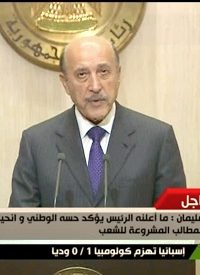
The good news is that the United States has long-standing ties with Omar Suleiman, the man who has recently been made vice president of Egypt and is poised to take charge whenever Mubarak steps down as a concession to the hundreds of thousands of demonstrators crowding the public square in Cairo to demand the President's resignation.
The bad news is that Suleiman has for the past 18 years been head of the intelligence service in Egypt that has been the subject of "credible allegations," according to the U.S. ambassador in Cairo, of routinely using torture as a method of extracting confessions from suspected enemies of the Mubarak regime. According to diplomatic cables published by Wikileaks, the Egyptian State Security and Investigative Service thanked the United States for providing "training opportunities" for SSIS agents at the FBI academy in Quantico, Virginia. At a time when much of Egypt's population is in rebellion against Mubarak's dictatorial regime, news of the U.S. connection to the SSIS may not be well received on the streets of Cairo.
In an April, 2009 dispatch, Ambassador Margaret Scobey sent word to officials in Washington that "Egypt's police and domestic security services continue to be dogged by persistent, credible accusations of abuse of detainees." The intelligence service has also been used by the Interior Ministry to "monitor and sometimes infiltrate the political opposition and civil society," the cable said. "SSIS suppresses political opposition through arrests, harassment and intimidation." An October, 2009 cable told of accounts from "credible" human rights lawyers of torture by "electric shocks, sleep deprivation and stripping (suspects) naked for extended periods." Despite government claims that instances of prisoner abuse are rare, "human rights lawyers believe it continues to be a pervasive, daily occurrence in prisons, police station and interior ministry state security headquarters," the dispatch said.
A posting by Jane Mayer on the web site of The New Yorker magazine offers some insight on both Sulieman and the effectiveness of his methods in providing "intelligence" for the Egyptian and other governments, including our own. Sulieman has been, Mayer writes, "the main conduit between the United States and Mubarak." And the United States has provided the Egyptian inquisitor with suspects to interrogate through a program of "extraordinary rendition." The case of one such rendition, that of suspected al Qaeda operative Ibn Sheikh al-Libi offers a cautionary tale about relying on torture for intelligence gathering.
As Mayer relates, Libi was captured by Pakistani authorities in November, 2001 and turned over to U.S officials at Bagram Air Base in Afghanistan, where he was questioned by two FBI agents from New York. The agents believed they were making progress in gaining useful information —"actionable intelligence" in government jargon — but they lost out in a turf war with the CIA for custody of the prisoner. The CIA director, appealing directly to President Bush and Vice President Cheney, prevailed and the suspect was soon bound and blindfolded and put on a flight to Egypt. In cases of extraordinary rendition, U.S law requires our government to get assurances from the government doing the interrogation that torture will not be employed. But such assurances, when given, are of little worth. Officials who either employ torture themselves or permit its use by others are not likely to be too scrupulous to lie about it.
Libi later gave the CIA an account of his imprisonment in Egypt, an account contained in a report released in 2006 by the U.S. Senate Select Committee on Intelligence. He reported being locked in a tiny cage for 80 hours and then punched repeatedly for about 15 minutes. His interrogators, Mayer wrote, were insisting on information that would confirm suspicions that Iraq was giving al Qaeda biological and chemical weapons. That would, of course, be useful to the Bush administration in building a case for invading Iraq.
Apparently the battering of al-Libi "worked" in the sense that it was effective in getting the prisoner to say what his interrogators wanted to hear. Eventually Libi gave in and "confessed' to an al Qaeda alliance with Saddam Hussein and to details about Iraq's "weapons of mass destruction" that made their way through U.S. government channels and were presented at the United Nations by Secretary of State Colin Powell as part of the case for using military force to disarm the Iraqi dictator.
After the invasion and the fruitless search for the mysterious and elusive "weapons of mass destruction," the FBI asked Libi why he had lied to the Egyptians. As Michael Skiff and David Corn reported in their book, Hubris, Libi had a simple and entirely plausible explanation. "They were killing me," he said. "I had to tell them something."
Such is the effectiveness of beating "the truth" out of a prisoner or employing excruciatingly painful tactics that our government likes to call "enhanced interrogation" techniques. Thus do governments, including our own, gather "intelligence" so certain that CIA director Tenant could give President Bush "slam-dunk" assurance of the presence of "weapons of mass destruction" in Iraq. And thus do "intelligence" agencies give intelligence a bad name.
Photo: Egyptian Vice President Omar Suleiman makes a televised statement to his nation in this image taken from TV aired on Feb. 10, 2011: AP Image



